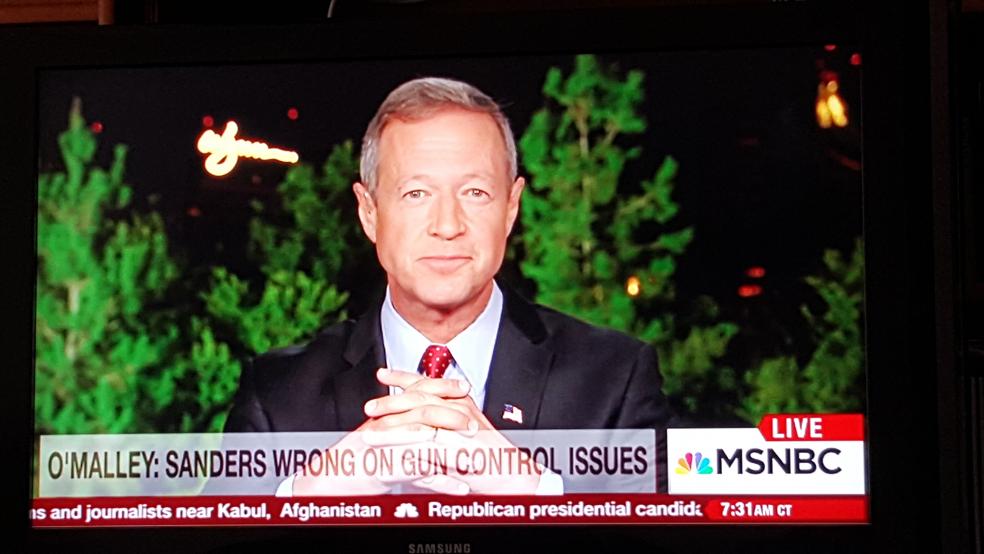Desperate to gain some kind of traction in the polls, Martin O’Malley deftly maneuvered through the Democratic Party’s inaugural presidential debate to show he at least belongs on the same stage as former secretary of State Hillary Clinton and the insurgent Sen. Bernie Sanders (I-VT).
Tuesday night’s two-hour event in Las Vegas was widely expected to be a two-person horserace between Clinton and Sanders, but the former Maryland governor held his own on a range of domestic and foreign policy issues.
Related: O’Malley, the Dems’ David, Could Use First Debate as His Slingshot
O'Malley, who entered the race in May, has struggled to establish himself as a viable alternative to Clinton. His support hovering around just a few percentage points, Tuesday night's debate was his first opportunity to introduce himself to voters nationally. “After 15 years of executive experience I have learned how to be an effective leader," O’Malley said during his introduction before he rattled off his progressive bona fides, including expanding the DREAM Act at the state level and passing comprehensive gun safety legislation.
From the opening moments of the debate, O’Malley seemed to be reeling under tough questioning by CNN’s Anderson Cooper about his “zero tolerance” policing activities while Mayor of Baltimore that many linked to ongoing community unrest and last spring’s riots.
But O’Malley saw an opening when Clinton began berating Sanders, a self-described Democratic-socialist, for his opposition to gun control laws and his support for giving gun manufacturers immunity from prosecutions from mass shootings, like the recent tragedy in Oregon.
When asked by Cooper whether Sanders was tough enough on guns, Clinton replied, “No, not at all. I think that we have to look at the fact that we lose 90 people a day from gun violence. This has gone on for too long and it’s time the entire country stood up to the NRA.”
Related: Debate Night: 5 Critical Issues That Clinton and Sanders Will Clash Over
O’Malley boasted that as governor, he passed tough gun control legislation in the Maryland Assembly over considerable tough opposition. “I’m glad we’re talking about these things, but I’ve actually done them,” he said. “We passed comprehensive gun safety legislation not by looking at what the polls said--we actually did it.”
When Sanders said he was limited in what he could do because he represents a rural state, O’Malley replied that there are plenty of rural areas in Maryland that support hunting, yet he was able to pass legislation that respected the views of hunters, “And we did it by leading with principle, not by pandering to the NRA.”
Later, O’Malley didn’t back down when the debate moved to national security and when the candidates would be willing to use military force.
“No commander-in-chief should take the military option off the table,” he said.
Related: Where Hillary Clinton, Bernie Sanders and Martin O’Malley Stand on the Issues
He later used a question about the 2012 terrorist attack on the U.S. diplomatic outpost in Benghazi, Libya, to chide Clinton’s tenure as the nation’s top diplomat.
O’Malley argued the assault showed, “We need to do a much better job as a nation of having human intelligence on the ground so that we know who the emerging next generation leaders are who are coming up to replace a dictator when his time on this planet ends.”
It wasn’t all smooth sailing though. O’Malley seemed to get ahead of himself when addressing the topic of Russia’s military build-up in Syria.
“I think Assad's invasion of Syria will be seen as a blunder," O'Malley said, mistakenly referring to the country’s longtime president.
But he teamed up with Sanders to tangle with Clinton on fiscal policy, saying she doesn’t want to reinstate Glass-Steagall, a Depression-Era law that separated the banking industry from the securities industry that was repealed in 1999.
O’Malley acknowledged that he was “glad” to support Clinton in 2008 “but something happened in between.”
He criticized both Sanders and Clinton for “old thinking” when it comes to immigration, touting his efforts at the state level that he argued went further than President Obama on programs like the Deferred Action for Childhood Arrivals (DACA) that allows undocumented individuals who came to the U.S. as children to stay provided they meet certain requirements.
While O’Malley rose to the occasion, the two other Democratic contenders, former U.S. senator Jim Webb (VA) and former Rhode Island governor and U.S. senator Lincoln Chafee, were non-factors.
Many of Webb’s answers fell flat with the crowd and he spent most of the night bickering with Cooper for more face time.
Chafee, who at the beginning of the night called himself a “block of granite,” gave perhaps the night’s worst answer when he chalked up his opposition to Glass-Steagall to be newly arrived in the Senate following the death of his father.
“I think you’re being a little rough on me,” he said to Cooper.
In his closing statement, O’Malley complimented his fellow contenders and drew a contrast with the two Republican presidential debates.
“You didn’t hear anyone denigrate women” or make racist comments or speak ill of another American “because of their religious beliefs,” he said.






